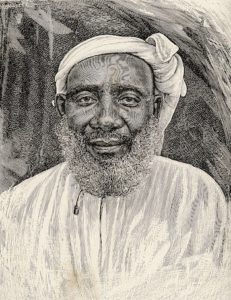
Tippu Tip
*This date marks Independence Day for the African Country Zanzibar in 1961. We chose this date to affirm the birth of Tippu Tip circa 1832. He was a Swahili Zanzibar slave owner and slave trader to European colonists.
It is believed that Tippu Tip was born in Zanzibar; his birth name was Hamad bin Muhammad bin Juma bin Rajab el Murjebi. However, he was more commonly known as Tippu Tib, meaning "the gatherer together of wealth." His mother, Bint Habib bin Bashir, was a Muscat Arab of the ruling class. His father and paternal grandfather were coastal Swahili who had taken part in the earliest trading expeditions to the interior.
His paternal great-grandmother, wife of Rajab bin Mohammed bin Said el Murgebi, was the daughter of Juma bin Mohammed el Nebhani, a member of a respected Muscat (Oman) family, and a Bantu woman from the village of Mbwa Maji, a small village south of what would later become the German capital of Dar es Salaam. Tip himself was a well-bred carriage with a "Negroid" countenance. He was named Tippu Tip after the "tiptip" sound that his guns gave off during expeditions in Chungu territory.
At a relatively young age, Tip led a group of about 100 men into Central Africa, seeking slaves and ivory. After plundering several large swathes of land, he returned to Zanzibar to consolidate his resources and recruit for his forces. Following this, he returned to mainland Africa. Tippu Tip built a trading empire, using the profits to establish clove plantations in Zanzibar. Abdul Sheriff reported that when he left for his twelve years of "empire building" on the mainland, he had no plantations. By 1895, he had acquired "seven 'shambas' [plantations] and 10,000 slaves". He helped several white-European explorers of the African continent, including David Livingstone and Henry Morton Stanley.
After the Berlin Conference, between 1884 and 1887, he claimed the Eastern Congo for himself and for the Sultan of Zanzibar, Bargash bin Said al Busaidi. Despite his position as protector of Zanzibar's interests in Congo, he managed to maintain good relations with the Europeans. When, in August 1886, fighting broke out between the Swahili and the representatives of King Leopold II of Belgium at Stanley Falls, al-Murjabī went to the Belgian consul at Zanzibar to assure him of his "good intentions." Although he was still a force in Central African politics, he could see by 1886 that power in the region was shifting.
In 1886, while Tippu Tip was in Zanzibar, a dispute arose between his fort at Stanley Falls and a smaller, nearby Congo Free Statefort led by Captain Walter Deane and Lt. Dubois. Tip's men at the Stanley Falls fort alleged that Deane had stolen a slave woman from an Arab officer there. Deane asserted that the girl had fled after being badly beaten by her master and that he had only offered her refuge. Tip's men attacked the fort, and after a four-day siege, the defenders ran out of ammunition and fled, abandoning the fort. The Free State made no counterattack, and Tip began to move more men into the Congo, including several Arab slave captains and some Congolese leaders, such as Gongo Lutete.
During his tenure as governor, the Congo-Arab War broke out. In early 1887, Stanley proposed that Tippu Tip be governor of the Stanley Falls District in the Congo Free State. Leopold and Sultan Barghash bin Said of Zanzibar agreed, and Tippu Tip accepted. At the same time, he agreed to man the expedition to rescue the German governor of Equatoria (a region of Ottoman Egypt today in South Sudan). The latter had been stranded in the Bahr el Ghazal area due to the Mahdi uprising in Sudan. Tip traveled back to the Upper Congo in the company of Stanley, but this time by way of the Atlantic coast and up the Congo River. Aside from its doubtful usefulness, the relief expedition was marred by nearly annihilating its rearguard, a disaster Stanley attempted to blame Tip.
Around 1890/91, he returned to Zanzibar, where he retired. His son, Sefu, carried on the war. Tippu Tip wrote his autobiography, the first example of this literary genre in the Bantu Swahili language. Dr. Heinrich Brode, who knew him in Zanzibar, transcribed the manuscript into Roman script and German. It was translated into English and published in Britain in 1907. Tippu Tip died June 13, 1905, of malaria in his home in Stone Town, the main town on the island of Zanzibar.